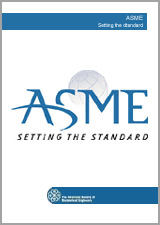We need your consent to use the individual data so that you can see information about your interests, among other things. Click "OK" to give your consent.

ASME STP-PT-022:2008
Comparison and Validation of Creep-Buckling Analysis Methods
Translate name
STANDARD published on 2008
The information about the standard:
Designation standards: ASME STP-PT-022:2008
Publication date standards: 2008
SKU: NS-1205224
The number of pages: 31
Approximate weight : 93 g (0.21 lbs)
Country: American technical standard
Category: Technical standards ASME
Annotation of standard text ASME STP-PT-022:2008 :
This report provides comparisons of creep-buckling calculations and provides guidance on approximate methods which are feasible for design. This report includes a discussion of the various creep models, presents creep buckling analysis techniques, and provides several comparative example calculations.
The techniques discussed in this report include:
- 1. Baseline analysis. Finite element creep analysis with different creep models and full non-linear strain-displacement (geometrical) analysis.
- 2. Critical strain technique. Elastic buckling strain defines the creep buckling strain.
- 3. Tangent/secant modulus approaches. Combinations of tangent and secant moduli of the isochronous stress-strain curve are used in calculations that reduce to elastic buckling calculations in the elastic case.
- 4. Use of an isochronous stress-strain curve in a limit/instability analysis of the imperfect structure. An instability (buckling) analysis would be in principle the same as Technique 3, and should generate the same answer. Adding plastic collapse as a failure mode ensures that the yield strength of the structure is not exceeded. This analysis therefore reflects the failure modes which are covered by the baseline technique.
We recommend:
Technical standards updating
Do you want to make sure you use only the valid technical standards?
We can offer you a solution which will provide you a monthly overview concerning the updating of standards which you use.
Would you like to know more? Look at this page.



 Cookies
Cookies
